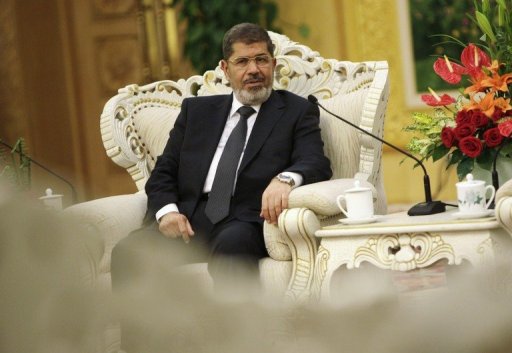President Mohamed Morsi is set to seek increased aid and investment from Europe for Egypt’s beleaguered economy when he visits Brussels on Thursday on his first trip to Europe since his election in June.
The Islamist president “wishes to talk about the support of the European Union during this transition period” for Egypt, his spokesman Yassir Ali said.
In the Belgian capital, Morsi will meet EU President Herman Van Rompuy, European Commission chief Jose Manuel Barroso and the EU’s foreign policy chief, Catherine Ashton.
He wants to “give impetus to cooperation with the European bloc and discuss potential investment in Egypt,” Ali added, indicating that Morsi’s discussions will focus on the economy in addition to political and diplomatic topics.
After Brussels Morsi will fly to Rome, one of Cairo’s most important economic partners in Europe.
There he will meet President Giorgio Napolitano and Prime Minister Mario Monti before returning home, official Egyptian sources said.
The 27-member European Union is Egypt’s largest trading partner, accounting for a third of the country’s foreign trade.
In 2011, Egypt imported EU goods worth 13.9 billion euros ($17.9 billion), European statistics show.
Combined with Egyptian exports to the bloc of 9.4 billion euros ($12.1 billion), this brings the volume of trade to 23.2 billion euros — more than double the 11.5-billion-euro figure of 2004.
Europe’s economic importance to Egypt has become even more vital to Egypt amid the transition following the ouster in February 2011 of long-time strongman president Hosni Mubarak.
The popular uprising that led to his resignation crippled Egypt’s once flourishing tourism industry, a main source of revenue.
Leftover evils from the ousted regime include rampant corruption, poverty, and poor infrastructure.
Tourism is edging back slowly following the crisis of 2011, but it still has a long way to go before reaching pre-uprising levels.
Central bank currency reserves plummeted from $36 billion to $15 billion in a year and a half, threatening the country’s ability to import basic goods and also to support the Egyptian pound.
Foreign investors, who were previously lining up to invest in Egypt, have been holding on to their reserves since the fall of Mubarak, sitting it out until stability returns.
But Egypt has launched an all-out offensive seeking out economic and financial aid from abroad.
On Sunday, Prime Minister Hisham Qandil urged a major visiting US business delegation to invest in the country, as he sought to showcase an attractive investment environment.
US Deputy Secretary of State Thomas Nides accompanied the delegation of more than 100 American executives aiming to promote private sector development in Egypt.
Egypt last month asked for a $4.8-billion loan from the International Monetary Fund, which in turn is seeking reforms from Cairo which also benefits from important financial support from the oil-rich Gulf nations.
Qandil said he hoped to reach an agreement with the IMF because that would be “a good sign to the world that Egypt is moving in the right direction.”
European officials will express “EU support for the democratic transition in Egypt” and a “eagerness to engage with the country’s new civilian authorities in furthering our partnership,” the EU office in Cairo said ahead of Morsi’s trip.
Morsi, born of the country’s once banned but powerful Muslim Brotherhood, took office on June 30 to become the country’s first president who had not come from the ranks of the military since the fall of the monarchy in 1952.
Since attaining office he has already travelled to Saudi Arabia, China and Iran, and will also visit New York at the end of the month for the annual UN General Assembly ahead of a visit to Brazil.

COMMENTS
Please let us know if you're having issues with commenting.